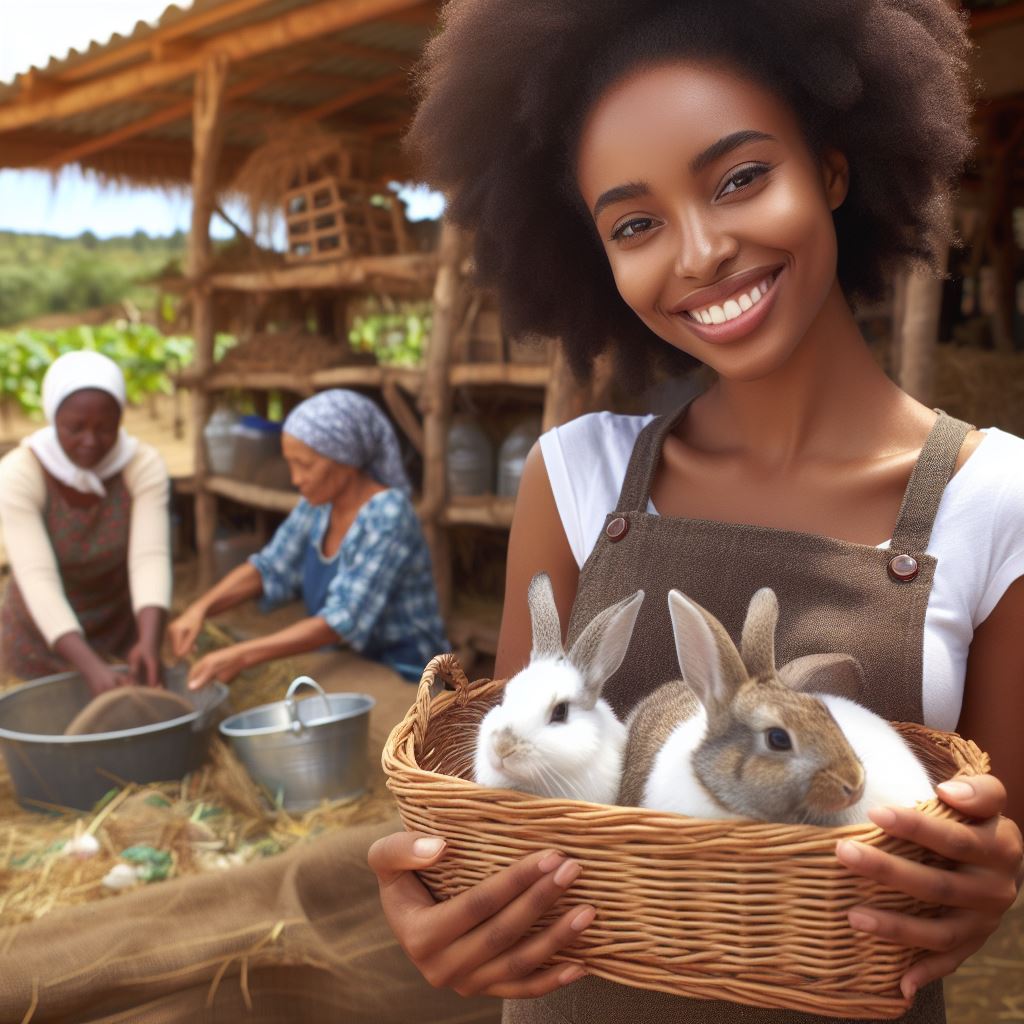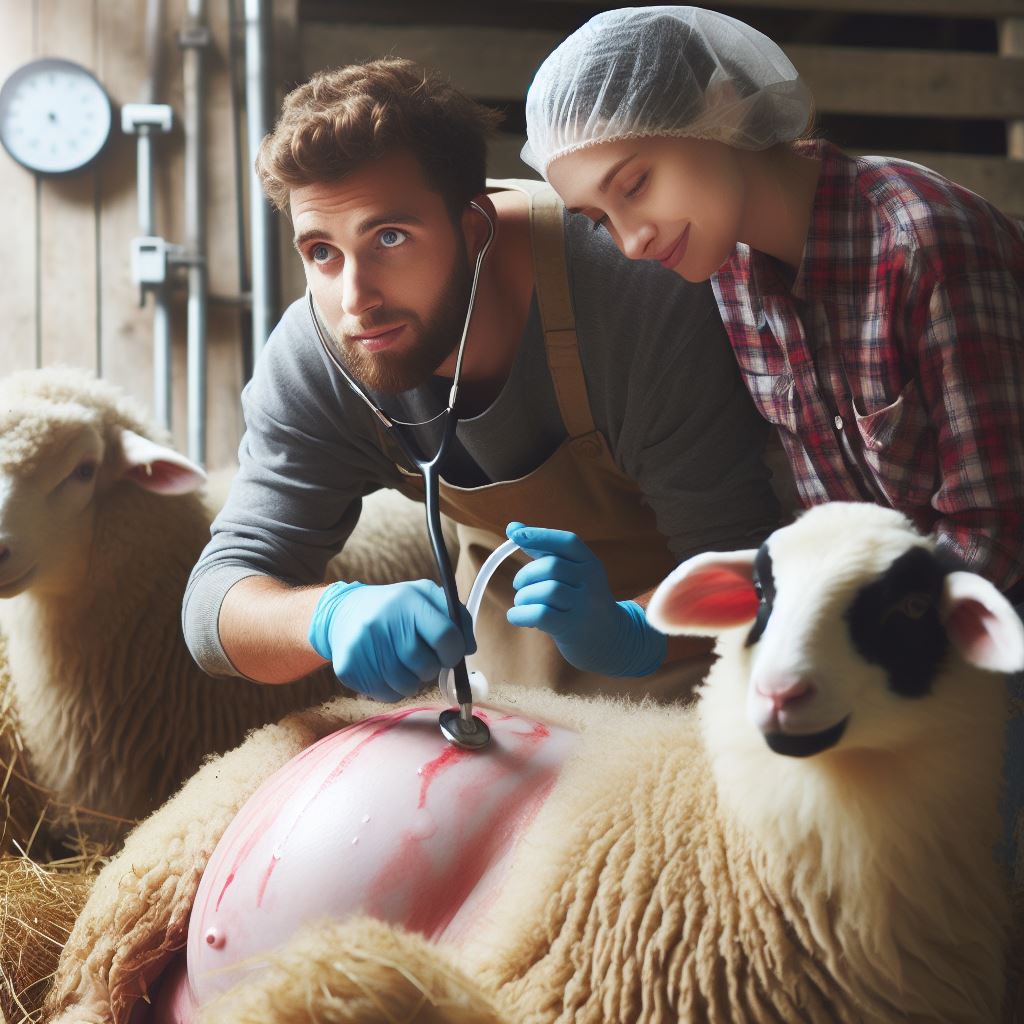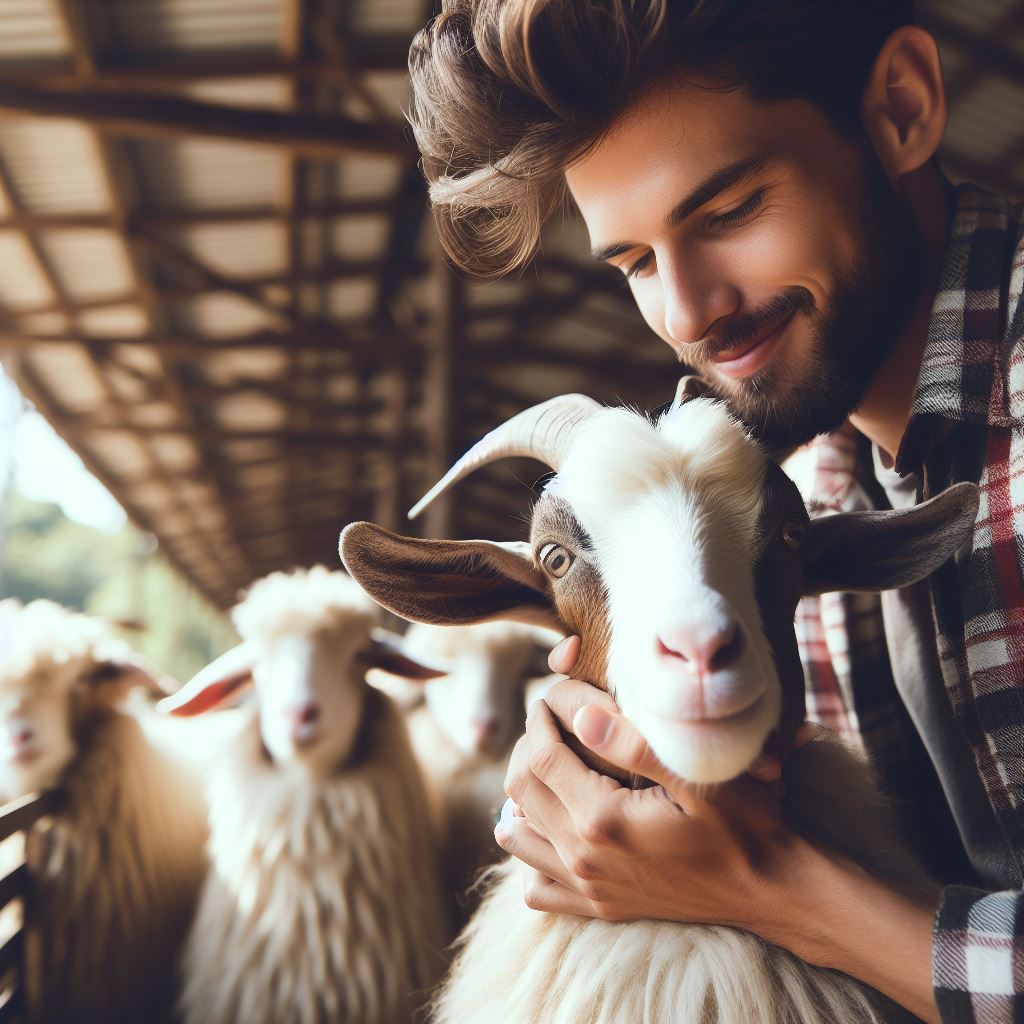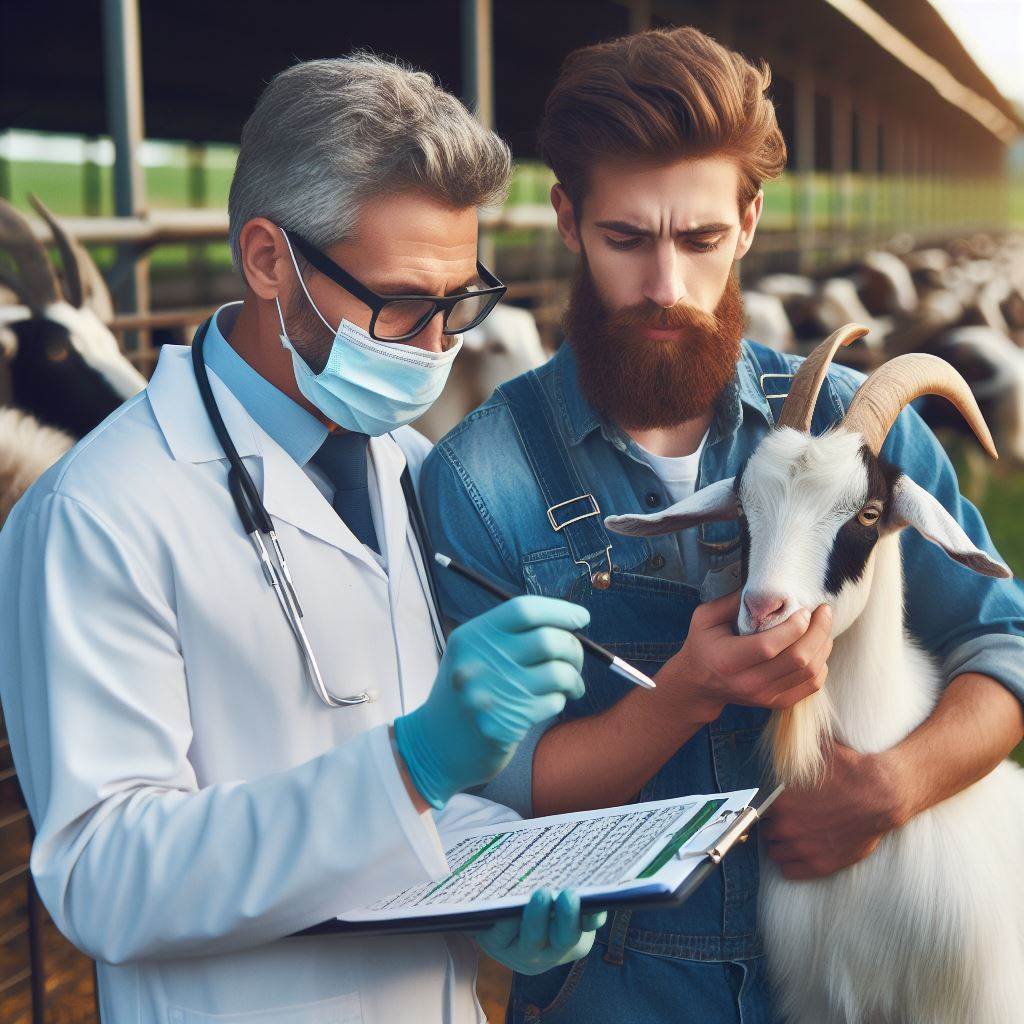Introduction
Definition and importance of sustainable rabbit farming
Sustainable rabbit farming refers to the practice of raising rabbits in a way that ensures long-term viability and environmental stewardship.
It involves using methods that minimize negative impacts on the ecosystem and prioritize the welfare of the animals.
The importance of sustainable rabbit farming lies in its ability to provide a consistent source of high-quality meat, fur, and other by-products while minimizing resource consumption and waste generation.
It offers a sustainable alternative to traditional livestock farming, which often contributes to deforestation, water pollution, and greenhouse gas emissions.
Brief overview of the key elements covered in the blog post
This blog post will cover various essential elements related to sustainable rabbit farming.
It will delve into the benefits of sustainable practices, such as reducing environmental impact and promoting animal welfare.
Additionally, it will explore techniques for sustainable feeding, breeding, and housing of rabbits.
The post will also discuss the importance of disease prevention and the role of proper management in sustainable rabbit farming.
Moreover, it will offer insights into marketing strategies for sustainable rabbit products and potential challenges faced by rabbit farmers.
Finally, the post will provide resources and recommendations for those interested in getting started with sustainable rabbit farming.
Overall, this blog post aims to inform readers about the definition, significance, and key aspects of sustainable rabbit farming.
It will serve as a comprehensive guide for individuals seeking to adopt responsible and sustainable practices in the rabbit farming industry.
The Benefits of Sustainable Rabbit Farming
Sustainable rabbit farming offers a range of benefits, not only for the environment but also for the economy and human health.
Environmental benefits
- Reduced carbon footprint: Traditional livestock farming contributes significantly to greenhouse gas emissions, while rabbit farming produces significantly fewer emissions due to their smaller size and more efficient feed conversion.
- Preservation of biodiversity: Raising rabbits for meat reduces pressure on wild animal populations. It decreases the demand for beef, pork, and poultry, allowing these species to thrive without the dangers of overexploitation.
Economic benefits
- Low investment and start-up costs: Compared to other livestock farming ventures, starting a rabbit farm requires minimal investment. Basic equipment, cages, and feed are relatively inexpensive, making it an accessible option for aspiring farmers.
- High potential profit margins: The demand for rabbit meat continues to grow due to its nutritional value and sustainability. With unique flavors and a rising interest in alternative meats, rabbit farmers can benefit from high profit margins and a niche market.
Health benefits
- Nutritional value of rabbit meat: Rabbit meat is a high-quality protein source that is low in fat and cholesterol. It contains essential amino acids, iron, and vitamins, making it a nutritious choice for a balanced diet.
- Antibiotic-free production: Sustainable rabbit farming avoids the excessive use of antibiotics commonly found in conventional animal farming. This reduces the risk of antibiotic resistance and promotes healthier meat consumption.
Overall, sustainable rabbit farming offers environmental, economic, and health benefits.
By reducing carbon emissions, preserving biodiversity, providing economic opportunities with low investment costs, offering high-profit margins, and delivering a nutritional, antibiotic-free meat source, this practice is an attractive option for farmers and consumers alike.
Transform Your Agribusiness
Unlock your farm's potential with expert advice tailored to your needs. Get actionable steps that drive real results.
Get StartedIn general, sustainable rabbit farming presents a promising alternative to conventional livestock farming.
Its environmental benefits, economic advantages, and healthful characteristics make it a worthy consideration for anyone interested in sustainable agriculture.
Read: Green Horse Care Strategies
Getting Started with Sustainable Rabbit Farming
Starting a sustainable rabbit farming venture can be an exciting and rewarding endeavor.
However, before diving into this agricultural practice, it is crucial to conduct thorough research and gain a comprehensive understanding of the essential aspects involved.
Research and understanding
Learning about rabbit breeds
One of the first steps in setting up a successful rabbit farm is to familiarize yourself with the various rabbit breeds available.
Different breeds have distinct characteristics, such as size, temperament, and meat production capabilities.
Researching and choosing the most suitable breed for your farming objectives is crucial.
Identifying local market demand
To ensure the long-term profitability of your rabbit farming enterprise, it is essential to evaluate the demand for rabbit meat and related products in your local market.
Conduct market research to determine the potential customer base, the competition, and the appropriate pricing strategies.
Understanding the market dynamics will guide your decision-making process and help you meet consumer needs effectively.
Setting up the rabbitry
Appropriate housing requirements
The well-being and productivity of the rabbits depend significantly on their living conditions.
Ensure that your rabbitry meets the appropriate housing requirements.
Design and construct spacious enclosures that protect the rabbits from predators, extreme weather conditions, and diseases.
Provide individual cages or group housing, depending on the breed and farming method chosen.
Creating a comfortable and safe environment
Rabbits are sensitive animals that require a comfortable and safe living environment.
Provide suitable bedding, such as straw or wood shavings, to ensure their comfort and prevent injuries.
Ensure proper ventilation to maintain optimal air quality and install adequate lighting to support the rabbits’ natural behavior and reproductive cycles.
Sourcing rabbits
Choosing a healthy breeding stock
Building a sustainable rabbit farming business relies on obtaining healthy and genetically sound breeding stock.
When sourcing rabbits, carefully evaluate their overall health, including physical appearance, activity levels, and reproductive records.
Select rabbits that are free from any genetic disorders or illnesses that could be passed on to future generations.
Considering genetic diversity
To maintain the long-term health and productivity of your rabbit herd, it is crucial to consider genetic diversity.
Inbreeding can lead to various health issues and reduced fertility rates.
Select breeding pairs that have minimal genetic overlap to ensure robust offspring and avoid potential genetic abnormalities.
Showcase Your Farming Business
Publish your professional farming services profile on our blog for a one-time fee of $200 and reach a dedicated audience of farmers and agribusiness owners.
Publish Your ProfileBy following these steps, you can start your sustainable rabbit farming journey on the right foot.
Remember to continuously educate yourself, seek advice from experienced rabbit farmers, and remain committed to providing the best possible care for your rabbits.
With dedication and passion, your rabbit farming venture can thrive while contributing to sustainable and ethical food production.
Read: Organic Livestock: Pros & Cons

Feeding and Nutrition
Rabbits, like any other living beings, have specific nutritional needs that must be met for them to thrive.
By ensuring a proper and balanced diet, rabbit farmers can contribute to the overall sustainability of their farms and promote the well-being of their livestock.
Nutritional needs of rabbits
Variety of feeds to meet requirements
Rabbits require a variety of feeds to meet their nutritional requirements.
This includes a combination of roughage or high-fiber feed, concentrates, and supplements.
Providing a diverse diet allows rabbits to obtain necessary nutrients for their growth, reproduction, and maintenance.
Sustainable feed options
Another essential aspect of rabbit nutrition is the availability of fresh water.
Rabbits consume significant amounts of water daily, and its regular provision is crucial for their overall health.
Water helps regulate body temperature, aids in digestion, and prevents dehydration.
Sustainable feed options
Utilizing locally sourced and organic feed
Utilizing locally sourced and organic feed is a sustainable option for rabbit farming.
By sourcing feed from local suppliers and ensuring its organic quality, farmers reduce the carbon footprint associated with transportation while promoting environmentally friendly practices.
Homegrown options such as hay and vegetables
Homegrown options such as hay and vegetables are also highly sustainable feed alternatives for rabbits.
Farmers can grow their own hay, ensuring a steady supply of high-quality roughage.
Additionally, providing fresh vegetables not only offers a varied diet but also minimizes the reliance on commercially produced feeds.
Incorporating sustainable feeding practices is not only beneficial for the environment but also for the rabbits’ health and productivity.
By prioritizing locally sourced and organic feed, farmers support the local economy while avoiding the potential contaminants present in conventional feed options.
Growing hay and vegetables on the farm not only reduces the reliance on external suppliers but also allows farmers to have better control over the quality and safety of the feed.
Furthermore, homegrown options can be grown alongside other crops, utilizing available land resources more efficiently.
Additionally, sustainable feed options often promote natural feeding behaviors and mental stimulation for rabbits.
Hay, for instance, encourages foraging and chewing, which helps maintain their dental health.
Fresh vegetables also provide a variety of tastes and textures, enriching the rabbits’ diet and preventing boredom.
To ensure the optimal feeding and nutrition for rabbits, farmers should consult with veterinary professionals or experienced rabbit breeders.
These experts can provide guidance on the specific nutritional requirements for different rabbit breeds and stages of life.
Additionally, they can help farmers develop personalized feed plans based on their available resources and objectives.
In fact, feeding and nutrition play a crucial role in sustainable rabbit farming.
By meeting the nutritional needs of rabbits through diverse feeds and providing ample fresh water, farmers can optimize their livestock’s well-being.
Utilizing sustainable feed options, including locally sourced and organic options, as well as homegrown hay and vegetables, not only benefits the environment but also enhances the overall health and productivity of rabbits.
It is essential to prioritize sustainable practices to ensure the long-term success and resilience of rabbit farming operations.
Read: Organic Wool Production Guide
Health and Disease Management
Maintaining the health of your rabbits is an essential aspect of sustainable rabbit farming.
By regularly monitoring their health, you can identify any potential diseases or issues and take appropriate action promptly.
Regular health monitoring
It is crucial to recognize signs of common rabbit diseases.
Common diseases in rabbits include respiratory infections, gastrointestinal stasis, and mites infestation.
By being familiar with the symptoms of these diseases, you can detect them early on and prevent their spread to the rest of your herd.
If you notice any abnormal behavior or symptoms such as sneezing, coughing, diarrhea, loss of appetite, or changes in fur appearance, it is essential to isolate the affected rabbit and seek veterinary advice immediately.
Prompt action is vital to contain the disease and prevent its spread.
Apart from recognizing signs, implementing preventative measures is crucial to maintain rabbit health on your farm.
Showcase Your Farming Business
Publish your professional farming services profile on our blog for a one-time fee of $200 and reach a dedicated audience of farmers and agribusiness owners.
Publish Your ProfileThis includes practicing proper hygiene by regularly cleaning their living areas, providing adequate ventilation to minimize respiratory issues, and maintaining a balanced diet to boost their immune system.
Introducing quarantine protocols is also crucial when bringing in new rabbits to your farm.
Isolating new arrivals for a specific period, preferably two weeks, allows you to observe and ensure their health before introducing them to the rest of your herd.
This minimizes the risk of introducing diseases and parasites to healthy rabbits.
Natural remedies and alternative treatments
In sustainable rabbit farming, the use of natural remedies and alternative treatments can be beneficial in maintaining rabbit health.
Herbal supplements and plant-based treatments can provide additional support for their immune system and overall well-being.
Herbal supplements like echinacea, chamomile, and garlic can help boost their immune system, improve digestion, and prevent common infections.
These supplements can be added to their diet or administered in their water source.
It is important to note that while natural remedies can be effective, consulting with a veterinarian is still necessary.
A veterinarian experienced in rabbit health can provide guidance on the suitability and dosage of herbal supplements and alternative treatments.
They can also assist in identifying underlying health issues that may require additional medical intervention.
When using alternative treatments, it’s crucial to remember that they should complement conventional veterinary care, not replace it.
A combination of both natural remedies and professional guidance ensures the best outcomes for your rabbits’ health.
By regularly monitoring the health of your rabbits and implementing preventative measures, you can minimize the risk of diseases and maintain a healthy herd.
Incorporating natural remedies and alternative treatments can provide additional support, enhancing the overall well-being of your rabbits in a sustainable manner.
Read: Ethical Livestock Breeding Tips
Marketing and Selling Rabbit Products
In order to successfully market and sell rabbit products, it is important to identify the target markets and develop effective strategies to reach them.
Two potential target markets for rabbit products are restaurants and food establishments, as well as local consumers and farmers markets.
Identifying target markets
Restaurants and food establishments provide an excellent opportunity to promote rabbit meat as a sustainable and delicious protein option.
By highlighting the unique taste and nutritional benefits of rabbit meat, it can be positioned as a desirable menu item.
Additionally, emphasizing the environmental benefits of rabbit farming can attract establishments that value sustainability.
Local consumers and farmers markets are another key target market for rabbit products.
These individuals are often conscious about their food sources and support local farmers.
By showcasing the high quality and sustainable nature of rabbit farming, it can appeal to consumers who prioritize ethical and environmentally-friendly choices.
Branding and packaging
To effectively market rabbit products, branding and packaging play a crucial role.
Creating a unique and appealing brand identity is essential for standing out in a competitive market.
This can be achieved by developing a recognizable logo and a consistent brand message that communicates the values of sustainability and responsible farming.
Packaging is another important aspect of marketing rabbit products.
Sustainable and eco-friendly packaging options should be considered to align with the values of the target market.
Using biodegradable or recyclable materials not only reduces environmental impact, but also strengthens the brand’s image as an eco-conscious choice.
Building customer relationships
Building strong customer relationships is paramount for successful selling.
Social media platforms provide an excellent avenue for engaging with customers on a personal level.
By sharing updates, behind-the-scenes stories, and customer testimonials, rabbit farmers can build trust and loyalty among their customer base.
In addition to engaging with customers, providing educational content and recipes can also strengthen relationships.
By offering information about rabbit farming practices, nutritional benefits, and cooking tips, customers can gain a deeper understanding and appreciation for rabbit meat.
This educational approach can inspire confidence and encourage repeat purchases.
In review, marketing and selling rabbit products require careful consideration of target markets, branding, packaging, and customer relationships.
By effectively communicating the sustainability and deliciousness of rabbit meat, farmers can attract both restaurants and food establishments, as well as local consumers.
Developing a unique brand identity and utilizing eco-friendly packaging options can further enhance the marketability of rabbit products.
Lastly, building strong customer relationships through social media engagement and educational content can foster trust and loyalty among customers.
Showcase Your Farming Business
Publish your professional farming services profile on our blog for a one-time fee of $200 and reach a dedicated audience of farmers and agribusiness owners.
Publish Your ProfileConclusion
Recap of Key Points Covered
- Holistic Approach: Sustainable rabbit farming involves ethical care, eco-friendly practices, and responsible breeding strategies.
- Environmental Harmony: Balancing the ecological impact ensures long-term viability for both the farm and the environment.
Encouragement for Aspiring Sustainable Rabbit Farmers
- Future Farmers: Aspiring rabbit farmers, your commitment to sustainability contributes to a brighter, eco-conscious agricultural future.
- Learn and Apply: Acquire knowledge, implement sustainable practices, and cultivate a thriving rabbit farming venture responsibly.
Call-to-action for Readers to Share Their Own Experiences or Ask Questions
- Share Insights: Share your experiences in sustainable rabbit farming to enrich the community’s collective knowledge.
- Seek Guidance: Ask questions or seek advice, fostering an interactive platform for sustainable rabbit farming enthusiasts.
Sustainable rabbit farming embraces ethical practices and ecological balance.
Aspiring farmers, your journey starts here—learn, apply, share, and grow responsibly.




